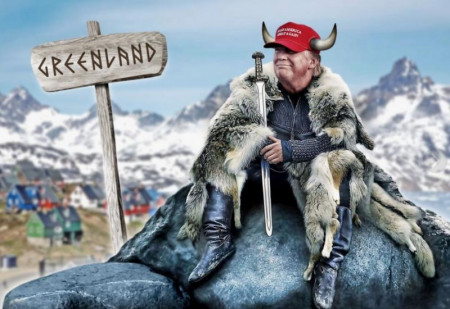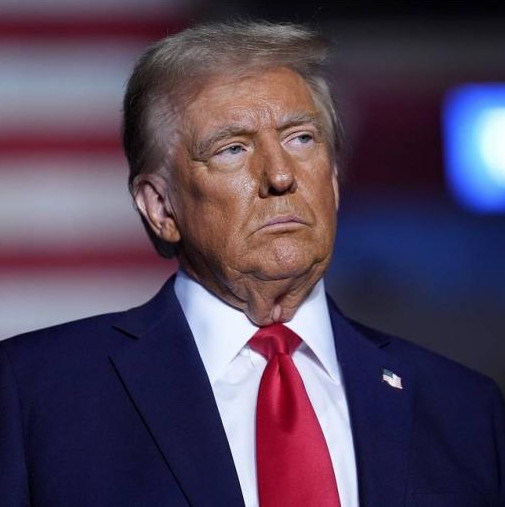
A few weeks before his inauguration, Donald Trump came up with a series of outstanding statements that made the world community confused. First, he announced plans to return the Panama Canal to US control, and then to annex Canada and Greenland. He even included the last two territories in the map to post on his Truth social media.
Speaking about his wish to annex Canada, Trump wrote that had the two states merged, "there would be no tariffs, taxes would go way down, and they would be TOTALLY SECURE." A day later, he said he would use "economic force" to encourage Canadians to abandon its artificially drawn border with the United States. Notably, Trump chose good timing to speak out about Ottawa. The country is now virtually powerless as ruling Liberal Party leader Justin Trudeau has resigned over his government’s numerous unpopular steps. And a new election will be only held in fall this year. But his statements have provoked sharp criticism with Canada’s political and public circles. "Trump will regret making Canada a state," writes Chris Wilson-Smith, a columnist for that country’s Globe and Mail broadsheet.
As for Greenland, during his first presidency, Trump had already proposed to the Danish authorities who own it to transfer the island to the United States for a long-term lease. But he got rejected back then. The Financial Times estimates Greenland at $1.1 trillion due to its rare earth minerals and resource potential. In particular, its relevant reserves account for some 40 million tons, uranium for 300,000 tons. The United States needs these resources to ensure its industry’s raw material independence.
Should Canada and Greenland merge, the US-controlled Arctic zone would be equal to Russia’s. The combined tripartite territory would account for about a quarter of the world's explored mineral deposits worth $78 trillion (the other quarter belongs in Russia and is estimated at $76 trillion). So, the accession of Canada and Greenland would allow creating a future raw material base to ensure technological leadership, if the United States requires additional energy and resource capacities. As a result, it might turn into a global leader in cryptocurrency mining (as Trump has already said) and in terms of combined computer industry power, as well as in developing AI as a critical factor for future economy, including the military-industrial complex.
Another point of tension is the Panama Canal, which, according to Trump, should be also transferred to the United States. Washington is its major user, carrying out 72 percent of all the relevant cargo transportation and covering for approximately 80 percent of Panama's income with passage fees.
The European partners of the United States have expressed misunderstanding in regard to its wishlist. Thus, German Chancellor Olaf Scholz referred to inviolability of borders as a fundamental principle of today's international law. But things being what they are, Europe will hardly manage to offer real resistance to him given that it is bound hand and foot by both NATO agreements and dependence on American energy, financial and technological resources.
Assessing the likelihood of these statements being implemented, I would like to note that the United States does not need to declare Greenland one of its states to institutionalize control over it. It may use the experience of Puerto Rico, which is formally considered an independent territory with a self-government system and its own Constitution, but exists under de facto American rule.
Canada is neither likely to become a new American state right away, but control over it is going to be tightened. Forces close and loyal to Trump may come to power there, like Pierre Poilievre known for his commitment to bitcoin and blockchain. So, most likely, Trump will not hurry with annexing his northern neighbor and focuses on stepping up ties with the future Canadian government while offering it new joint projects, primarily energy ones.
But intent to take control of the Panama Canal, despite active protests of the locals who have been fighting for decades to make this place their own, is quite feasible. Panama is a small country created by the Americans at the expense of the cut-off territory of Colombia in order to build a canal. And despite local youth currently burning North American flags, Panamanian politicians will likely seek some kind of compromise with Washington.
Interestingly, the United States has quite a lot of experience in seizing South American territories. Apart from the constant incursions into Mexican territory, its troops occupied Cuba (twice), Nicaragua, the Dominican Republic, Haiti, and Honduras. The seizure of Cuba was allegedly brought about its liberation from Spanish oppression. President Theodore Roosevelt once called such a strategy the Big Stick Policy, implying that anything goes if you are strong. But this direction may turn into the biggest challenges for the US president-elect.
In general, Trump's statements mark transition of American leadership from a liberal, "rules-based" international order to illiberal principles of competition, where the strongest can do anything. The Biden administration initiated the process by unleashing the Ukrainian conflict and masterminding Nord Stream diversions. As a result, Russia was squeezed out of the European market by force rather than economic competitive practices, with the United States coming to replace it.
Trump's statements show that he intends to proceed with this course. In the end, the United States will likely gradually abandon the all but open and regulated trade regime that it created after World War II, ushering in an era of economic nationalism through seizures and large-scale tariffs. The success will be based on factors such as energy, food, military, demographic, scientific and technological self-sufficiency, which Trump's "initiatives" are aimed to ensure. If his statements get implemented at the end of the day, the United States will oversee the entire competitive environment throughout the western hemisphere. The proposed mechanism will make it possible to control Europe as well. But does the United States need it if it consumes more than it gives back? Europe’s economic ties with Russia have been destroyed, and so is part of the industry which needed cheap Russian energy resources to compete with the United States. Thus, it is no longer dangerous as a global market competitor.
Under the current circumstances, Trump’s rhetoric has primarily been a signal to China as it expands its capabilities both in Latin America, where the Panama Canal is located, and Mexico, which, according to a report by the Global Capital Allocation Project (a joint center of the Stanford, Chicago and Columbia Universities), has an advantage in global manufacturing, including through dominance in lots of supply chains. Experience will show how viable this model turns out eventually. China, like other countries, is developing its own strategies for dealing with all the new terms and conditions.









